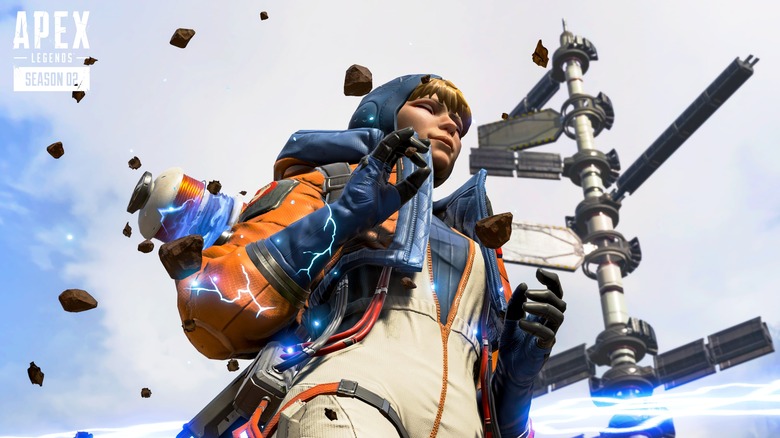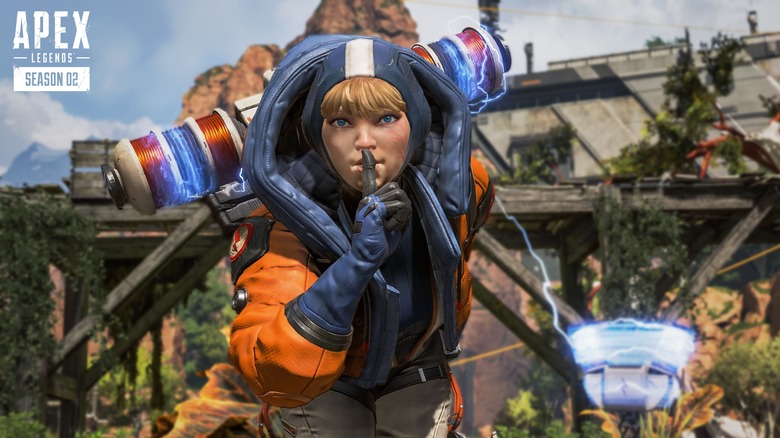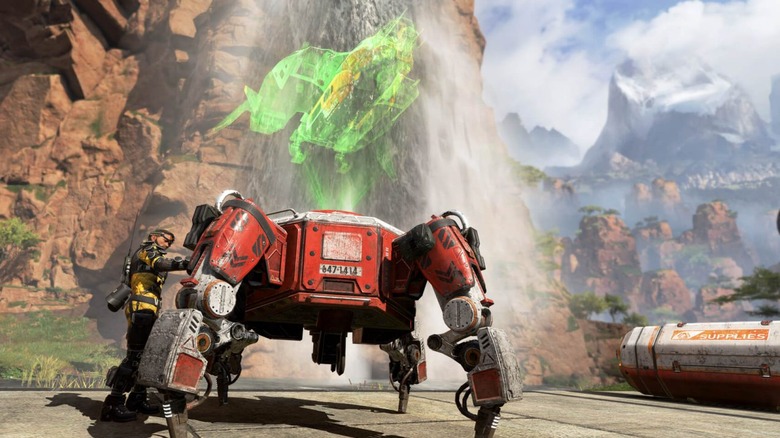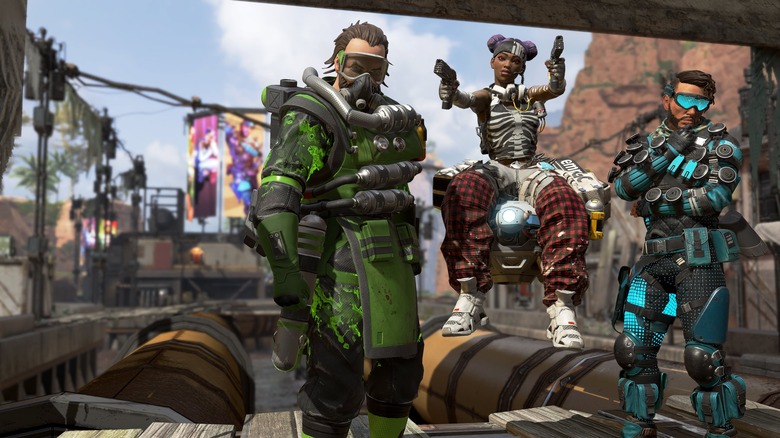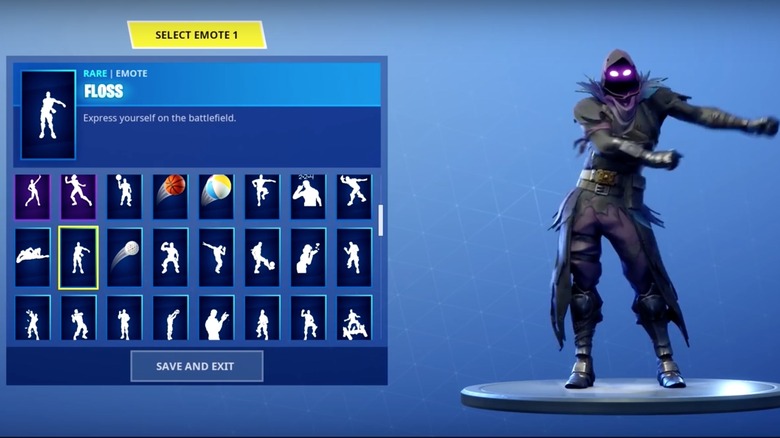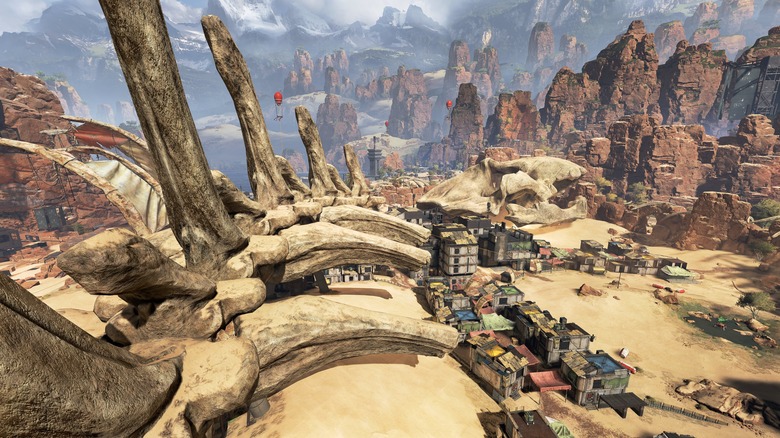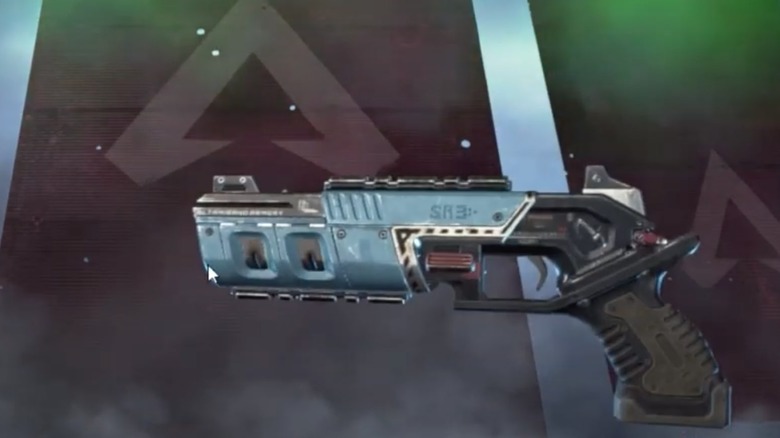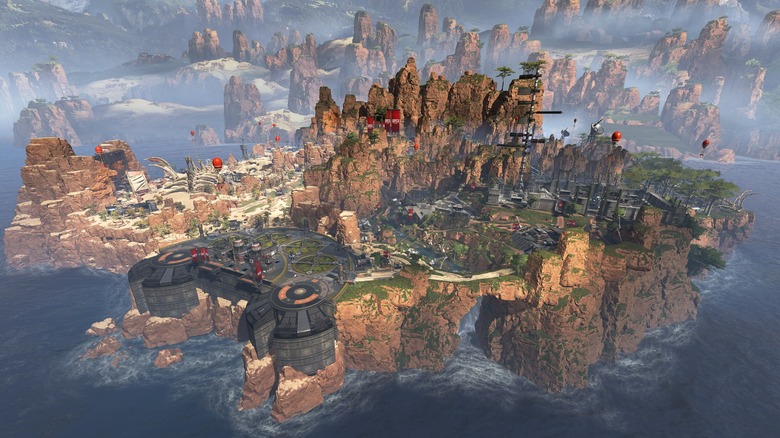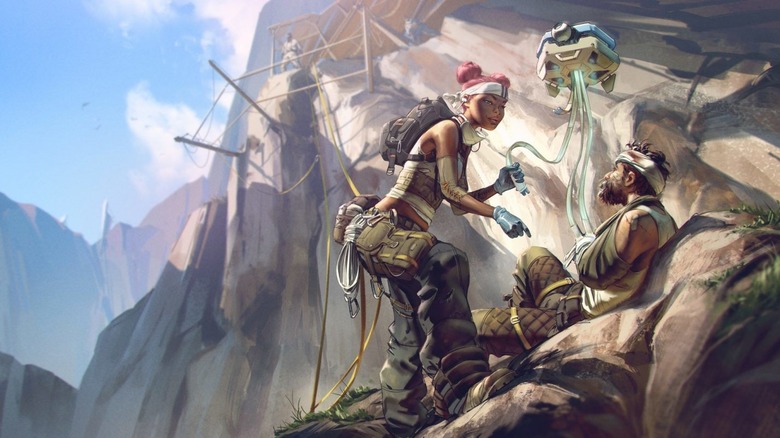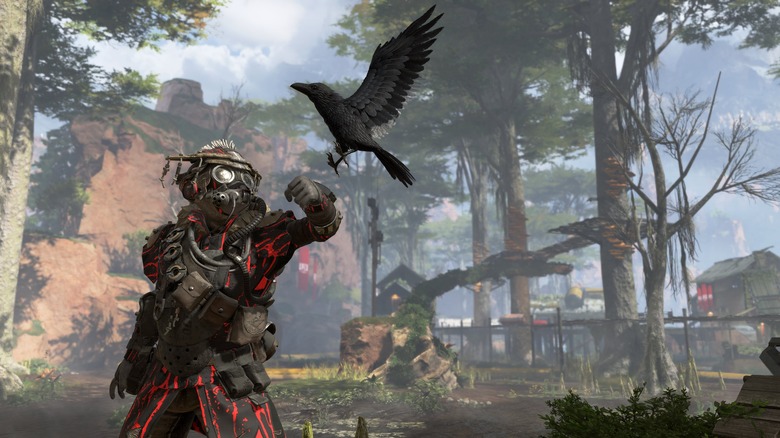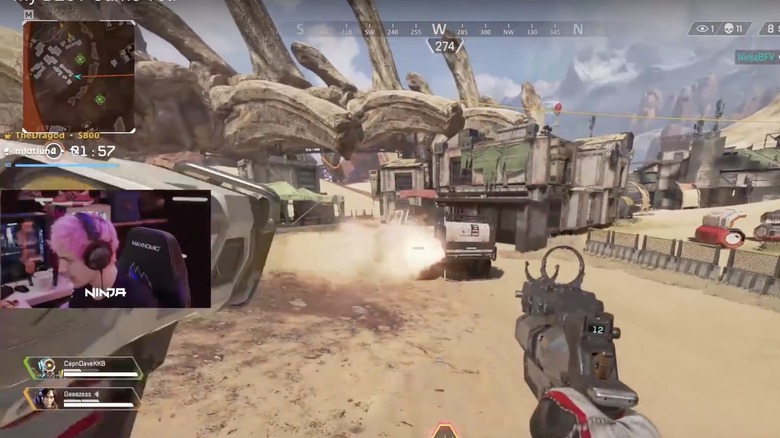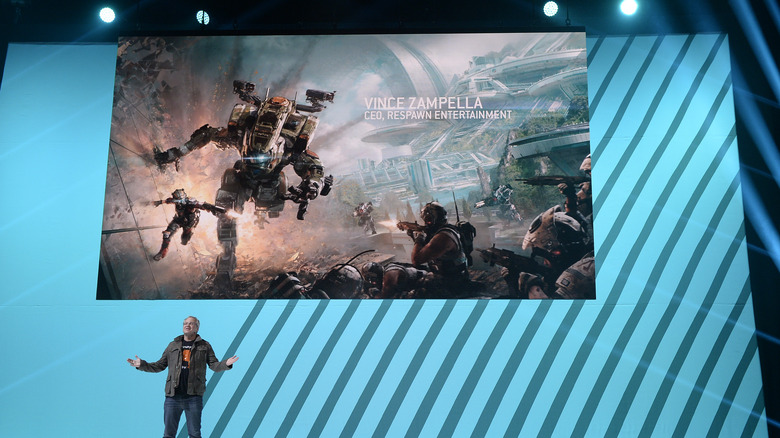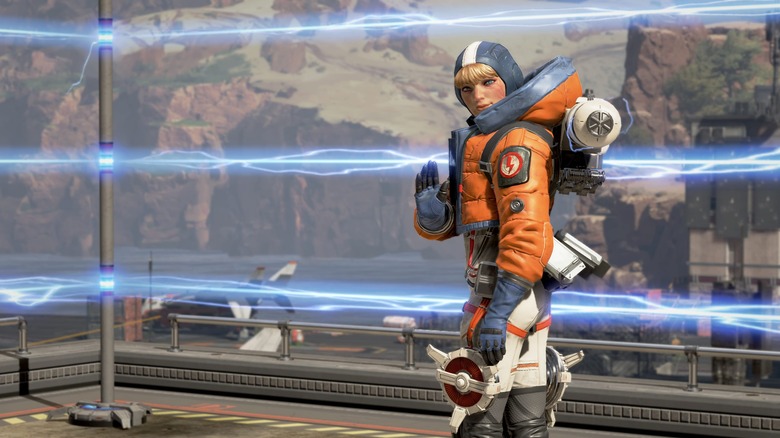Apex Legends Changed Gaming And You Barely Noticed
What makes the video game industry such a compelling, fascinating world to follow is the fact that it's always changing. Sure, most industries adapt and change with the times, but few evolve as rapidly video games. Whether through new consoles, updated graphics, or even new genres, games keep fans and critics on their toes, which means there's rarely a dull moment in the world of this interactive entertainment.
In just a couple of short years, battle royale games have emerged as a new genre, one that focuses on free-to-play competitive experiences, each with their own interesting twists. In early 2019, titles like Fortnite and PUBG ruled this genre. But then, Respawn Entertainment released Apex Legends and changed the landscape of battle royale seemingly overnight.
Whether you look at the game's one-of-a-kind marketing and release strategy, its immediate impact on Fortnite's core gameplay, or its vast improvement on multiplayer communication, Apex Legends has positively affected the gaming world — but it happened so quickly, that you may have barely noticed.
Improving communication
Unfortunately, toxicity has always been a major black mark on competitive multiplayer games. Sure, there's nothing wrong with a little trash talk between friends, but when you open up the lines of communication to strangers all over the world, you're bound to run into racism, misogyny, and a sickening amount of hate speech. This isn't news to you, especially if you've been playing online games for the past 15 years. Even in PUBG and Fortnite — games that require strategy and communication in order to win — you dealt with these things.
Then, Apex Legends came along and affected change through one major feature: the ping system. Using a series of button commands in a clever way, Respawn created a mechanic that allowed players to alert teammates of nearby enemies, the need for certain items, or the perfect route to take. After the game's release, people raved about this system, some wondering why no one implemented this before.
Mere weeks after launch day, Epic Games added a similar feature to Fortnite. While the developer made the right decision to add it to the groundbreaking battle royale, there's no doubt that Apex pushed the team to do so.
Time to respawn
When you jump into the battle royale genre for the first time, there are some specific elements you have to get used to — the big one being the fact that, when you die, you're done. It's not like playing a round of Team Deathmatch in Black Ops where you can die and respawn thirty times if that's the way your day's going. Adapting to a game mode where you can only die once is tough, and definitely turns some people off. As it turns out, Respawn Entertainment is appropriately named, considering it changed the battle royale game by implementing a respawn feature.
As you likely know if you've spent any time with Apex Legends, you can respawn your fallen teammates by grabbing their "banners" and taking them to any of the available respawn beacons on the map. It's not always easy to pull this off, as enemy squads will often camp at nearby beacons hoping to pick off vulnerable teams, but this mechanic definitely helps eliminate some of that "when you die, you're done" frustration.
And, as it turns out, this is yet another game mechanic that Epic Games has added to Fortnite, creating their own version of respawn beacons called "Reboot Vans."
Three-person squads
Cooperative and online multiplayer games have long featured two, four, or even eight-person teams. The standard has usually been four-person teams, especially for competitive games like Counter-Strike: Global Offensive, Call of Duty, or Gears of War. Even looking at something like Fortnite, the default game mode puts you in a team of four players. Then, Apex Legends came along and completely bucked that trend, focusing instead on three-person squads with a total of 60 players per game. At first, gamers harped on this fact, almost immediately uncovering source code that mentioned other modes — solo, duo, etc.
Yet, it seems that three-person squads are trending in the gaming industry. If you look at 2019's E3, you'd notice a multitude of games, both cooperative and competitive, featuring teams of three. Tom Clancy's Rainbow Six: Quarantine, announced by Ubisoft in June, is a three-player co-op experience. Gears 5's Escape Mode will focus on that same team size. Four's no longer the norm, and you have to give some credit to the success of Apex.
Ending the dancing trend
Fortnite made them mainstream, but emotes — especially dances — have become a huge part of competitive multiplayer games in recent years. Look no further than Destiny, The Division 2, and even Forza Horizon 4. Dancing emotes make up a huge portion of microtransactions and unlockables in these games, and they're great ways for companies to make money while simultaneously eliminating pay-to-win options. Still, it's tough not to get sick of these dances — you probably haven't gone a day without seeing the "Floss" in real life or in some form of media.
Thankfully, Apex Legends came along earlier this year and decided not to follow the trend of its fellow multiplayer experiences. There are absolutely no dances or emotes in the game, and that's refreshing. Because each legend in Apex has their own interesting personality, there's no need to shoehorn a series of emotive expressions into the game just to make characters feel unique. Give credit to Respawn for moving away from this trend. Now, if only they'd stop charging the equivalent of $18 for a single weapon skin ...
People will kill you, but falling won't
It's always nice when games eliminate outside damage factors and let you focus on simply not getting killed by your opponents. Unfortunately, major competitive games like Call of Duty, Battlefield, Fortnite, and PUBG all force you to focus on those extraneous factors, especially fall damage. If you've ever played any of the aforementioned games, you've likely found yourself in situations of sheer panic, where enemies are closing in and you're just trying to escape only to plummet off a high cliff to your death. There's honestly no worse feeling than self-inflicted death, but it's something every gamer does at some point.
That's why you have to give credit to Respawn, as the dev team decided that Apex had no use for fall damage. Outside of some edge-of-map areas where you can fall into the sea, you'll never take damage from gravity. No matter how high up you are, you can cover a lot of ground with no consequence just by jumping. It makes escaping fights or repositioning much easier, allowing you to fully focus on the enemies at hand. It's a wonderful system and hopefully becomes a trend in games.
Instead of removing terrible weapons, embrace them
When competitive games have a multitude of different weapons, it's often tough for developers to get the ideal balance across the board. Basically, the more guns added to a game, the more variables enter. It's why you see so many updates and patches to buff or nerf weapons in Destiny or PUBG. And, sometimes, if a specific gun affects the game in a negative way, a developer will take a more drastic approach and remove it completely. Epic Games has done this multiple times based on player feedback, "vaulting" Fortnite weapons like the Dual Pistols and Boom Bow.
Respawn has taken a different approach with its weaponry: embracing the diversity. The Mozambique, a small shotgun-pistol, has taken a beating in the Apex Legends community since launch. With low damage output and a tiny magazine, almost no one enjoys using the weapon despite its high drop rate. The team will add a hop-up upgrade during the Season 2 update but essentially said that this gun will stick around despite its mediocrity. In a hilariously self-aware move, Respawn even added an animation to the game which shows your player chucking the shotgun away in anger whenever you drop it from your inventory.
Smaller matches lead to more opportunities
You can go all the way back to H1Z1, billed as the "battle royale game that started it all," and you'll see how the trend of 100-player matches began. Over the past five years, the genre has become a huge part of the gaming world, and this large player count remains a constant factor across most battle royales. Fortnite still works with 100, designing multiple different modes — including a 50v50 mode — based around that number. However, when Apex Legends came along, it surprised people with its smaller size.
Along with its unconventional three-person squads, Respawn also implemented a much smaller player count, opting for 60-person matches. This immediately had an impact on game strategy, as it allowed smart players to adapt and innovate in order to survive and win. Instead of a meta where multiple kills become necessary on the path to victory, Apex Legends gives average competitors a new, strategic way to become champions. You can actually pick your battles in this game, opting to let enemy squads eliminate each other while you hunt for endgame loot and prepare for the smaller rings. These matches, which are 40% smaller than most battle royales, offer more opportunities for victory.
Adding some character
In most multiplayer games, your character's personality comes out through your loot and unlockables. Emotes, armor skins, weapon skins, tags: all these items are usually unlocked through progression, premium currency, or those controversial loot boxes. You see this clearly in the battle royale genre, with PUBG and Fortnite leading the way when it comes to nameless, voiceless "heroes" that are essentially blank canvases just waiting for you to load them up.
While there's no doubt that Apex Legends has similar unlockables and skins, it focuses more on adding actual backstories and personalities to its legends. Each of the ten (so far) legends has their own story and place in the game's lore. They have voices, accents, quips, and reasons for competing in those wild Apex Games. When you play and compare it to the other battle royales, Apex just feels more like a full game, and that's thanks to those characters having some, well, character.
Better representation
When Apex Legends released in February 2019, it dropped with six characters as well as two other unlockables ones. This selection of eight total legends featured two women of color, a gender non-binary character, and members of the LGBTQIA community. On release day, multiple communities that aren't often represented in video games were represented in Apex, and it was without a doubt one of the game's best aspects.
Respawn's new title immediately became one of the leading games available when it came to minority representation. People felt seen and heard, which shows the sheer importance of equality, even in something like video games. Kudos to the developer for realizing this, and hopefully others have taken notice, because it's crucial to feature these communities throughout the entertainment industry.
A smart use of influencer marketing
Ordinarily, a young development team would never wait until release day to announce a new IP in a genre dominated by a juggernaut like Fortnite. Yet, that's exactly what Respawn and EA did on Feb. 4, 2019, when it announced Apex Legends during a Twitch stream. It was immediately available for download. To everyone's surprise, this game took off right away. Its interesting take on the genre and diverse lineup of characters resonated with the gaming community, but it took more than that to bring in 50 million players in its first month.
Back in 2017, EA announced that it planned to spend more of its marketing budget on influencers and streamers. It proved that during Apex's rollout. EA partnered with some of the top streamers on Twitch, including Fortnite pros Ninja and Shroud, paying them as much as $1 million to play and tweet about the game on its release day. Thanks to this smart use of content creators and the Twitch platform, which it already used to announce the game, Apex Legends hit 2.5 million players in the first day. Clearly, it was money well spent for the publisher.
No more developer burnout
In 2018, around the release of Red Dead Redemption 2, Rockstar Games hit the news. Much to the company's chagrin, the media wasn't talking about the overwhelmingly positive reception to the game, but about the problematic practices and crunch found throughout the organization. In May 2019, CD Projekt Red reiterated its promise of "more humane" hours during Cyberpunk 2077 development, doubling down on statements made after reports of unacceptably long work weeks in 2017. Crunch culture runs wild throughout AAA game development and often leads to employee burnout.
At Respawn Entertainment, you won't find those lengthy hours anymore. While the studio did crunch in the lead-up to Apex's launch, it is now actively attempting to treat its workforce better. However, this will also result in fewer game updates when compared to Epic's Fortnite. It's already caused complaints among the community, which expects more patches, content, and communication from the Apex developer.
Despite the long lengths of time between content updates, there's no doubt that Respawn treats its employees better than most in the AAA space. Remember, there are real people behind these games, and they deserve regular hours and time off just like the rest of us.
Say goodbye to empty promises
If you put the phrases "empty promises" and "video game industry" in the same sentence, your brain likely makes certain associations right away. E3? Sure, that's filled with broken promises and flatout lies. Peter Molyneux? He's a pretty egregious example of a developer who overpromises and underdelivers. Often times, it seems as though the industry is built on lofty goals that end in disappointment for consumers and fans. That's why it's refreshing to know Respawn's stance on promises: they're not making any.
Respawn spends more time in silence and takes longer to update Apex Legends because it works hard to keep its workforce healthy and happy. When developers discuss future features and unreleased content, players expect it ASAP, so the Apex team chooses not to overextend expectations. That's why you won't see news articles and blog posts about new game content until the team has firm information on implementation and release. It's better for both sides when all is said and done.

